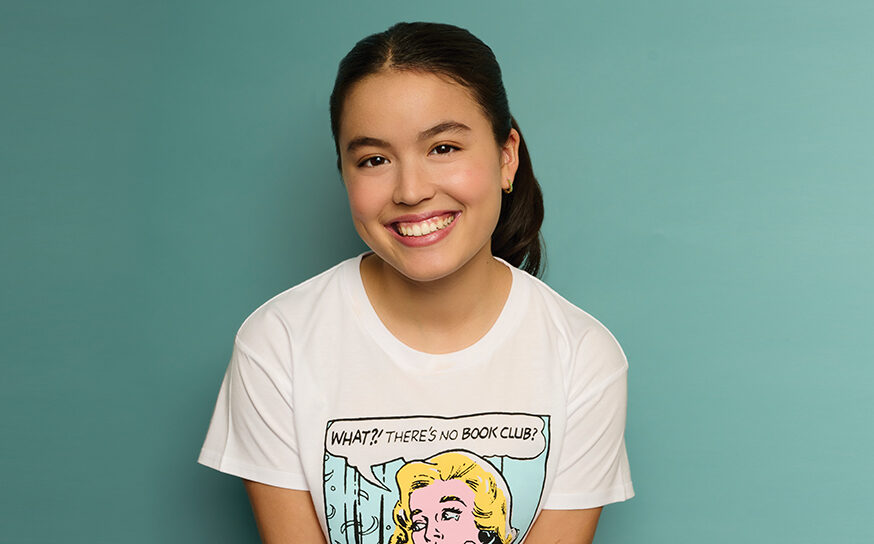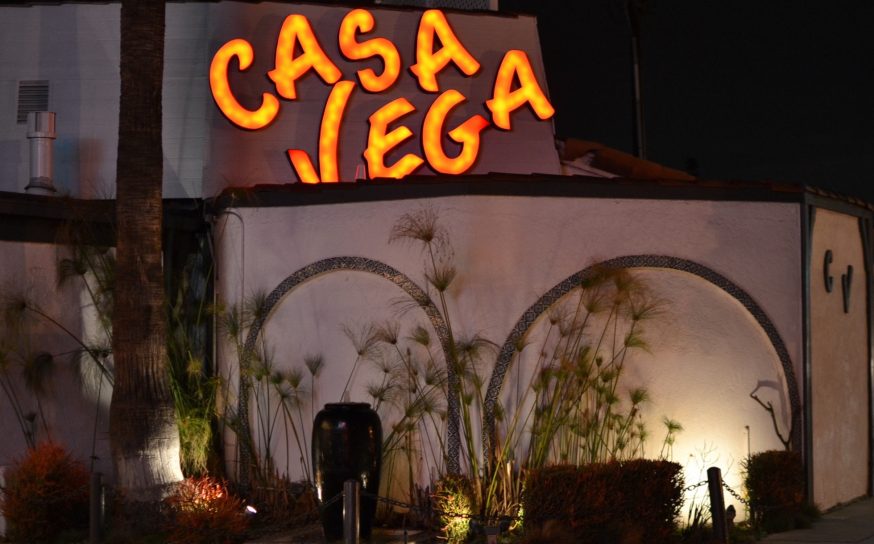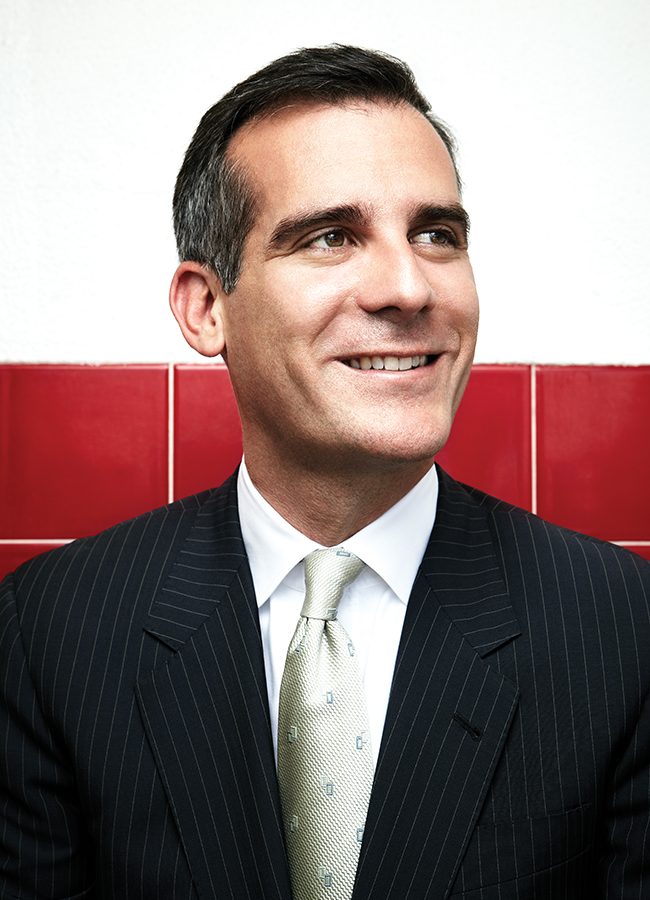
His Turn
Newly elected LA mayor Eric Garcetti on growing up Valley, the influence of his famous father and the passing of a political torch
-
CategoryUncategorized
-
Written byWillard Simms
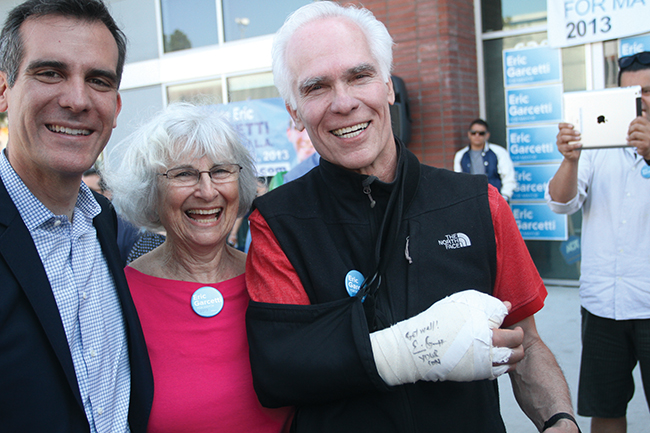
Parental pride Above: Eric with his parents, Sukey and Gil, while campaigning for mayor this past spring. Left: Addressing a crowd with (L to R) his parents; mother-in-law, D. Wakeland; sister, Dana Garcetti; and wife, Amy Elaine Wakeland (in blue dress).
Not every customer who goes up to the counter at Tommy’s gets an employee who remembers what he likes. But not everyone has been visiting this burger joint in North Hills for decades. And perhaps more notably, not everyone is the mayor of Los Angeles.
Son of former LA district attorney Gil Garcetti, Eric Garcetti is a Valley boy. While his credentials are impressive (Columbia University graduate, Oxford University Rhodes Scholar, USC international relations professor and three-time Los Angeles City Council president), an afternoon at Tommy’s proves he’s no ivory tower snob.
Diving into his burger, the mayor seems more like the blue-collar workers that fill the restaurant than an impeccably groomed politician in a three-piece suit. “Best burgers in the city,” he quips, between sips of root beer.
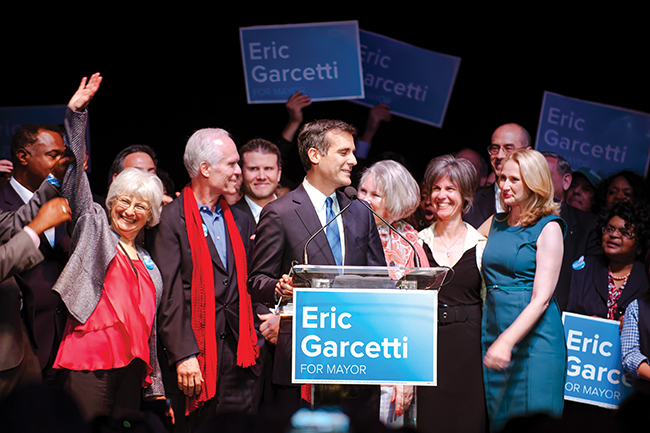
DEEP-ROOTED
“I lived in the Valley from when I was born to when I was 17,” Eric explains. He grew up in Encino with a family that also included a working mom and a sister. Gil Garcetti was an omnipresent figure in LA’s political scene from the ‘70s through the ‘90s. He served for 32 years in the district attorney’s office and was elected twice as LA district attorney.
Despite his political pedigree, Eric did not grow up with political aspirations. When he rode his bike from his Encino home to play Little League baseball in Balboa Park, Eric says he was more interested in becoming an astronaut, musical conductor (he is an accomplished pianist) or professional baseball player. His favorite place to spend time wasn’t downtown at City Hall alongside his dad but rather Balboa Park, where he’d ride his bike along the LA River and play baseball, tennis and golf.
As a boy, Eric wasn’t particularly impressed with his dad’s job. “Titles aren’t it,” he shares. “It’s about time and impact, having a long career and improving the lives of people. That’s what’s important.”
What Eric remembers most about his father is the effort he made to spend time with the family. “Even though Dad would sometimes get called away late at night and on weekends about a police shooting, he always made it a point to be home every night for dinner. And that’s when I’d pepper him with questions about everything he did.”
Young Eric, however, wasn’t above using his father’s title to his advantage on occasion. When an argument with a classmate at Corinne Seeds Elementary School (now the UCLA Lab School) culminated with the student telling Eric that his dad was a police officer, and he’d have Eric arrested, the young Garcetti shot back, “Well, my father is a district attorney, and I’ll have him prosecute your dad!”
Eric showed early signs that he was intelligent and talented. He did well at the competitive Harvard-Westlake School (Harvard School for Boys back then). But what most impressed his dad was his son’s ability to get along with so many different types of people.
Gil is Mexican-American; his wife, Sukey, is of Russian-Jewish descent. Gil maintains that he always believed his son’s people skills were simply inherent.
“It was a natural gift that goes way beyond me. He has an innate ability to connect to people. And he has a natural humility that makes him accessible,” Gil, now 72 years old, reflects.
That ability to connect with people of all walks of life will undoubtedly come in handy during Eric’s tenure as mayor, a job he takes on with several distinctions. He is the first elected Jewish mayor in LA history, as well as—at 42 years old—the youngest mayor of a major U.S. city in more than a century.
LASTING IMPRINTS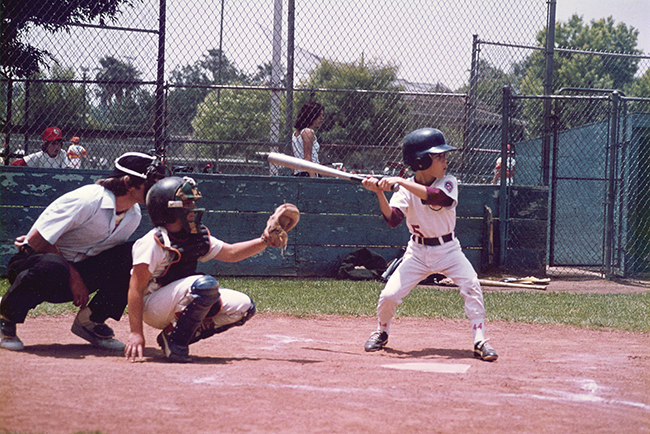
While highly respected by his peers, Gil Garcetti had a turbulent career—largely attributed to two high-profile incidents. Both left indelible impressions on his son.
First, some blamed Garcetti senior for the 1992 Rodney King riots. Critics held the DA’s office responsible for the police officer acquittals that sparked the riots and the ensuing unrest that clouded the city. Among other things, critics felt that the jurors were desensitized to the violence of the beating when the prosecution allowed the defense to play the videotape repeatedly in slow motion, lessening its impact.
Then a few years later, Gil’s office was tainted by O.J. Simpson’s notorious acquittal. The prosecution lost critical ground to flashy defense attorney Johnnie Cochran and his “If the glove don’t fit, you must acquit” courtroom theatrics. Many people in LA blamed the DA’s office for exonerating O.J., a man they believed was guilty of murder.
With both these experiences, Eric learned first-hand the toll public scrutiny and harsh comments can take on family members. And the Los Angeles media is notoriously sharp-tongued.
“It’s painful to be the loved one watching someone you know being so publicly criticized. They can answer back, but you have no voice to do that.”
"I feel too often the Valley gets short- changed. If the Valley were a separate city, it would be the sixth largest in America.”
SECOND ACTS
The race for district attorney in 2000 was bitter and contentious. Gil Garcetti was blamed by the white community for losing the O.J. Simpson trial and attacked by the black community for siding with the police in cases involving police brutality.
Gil’s opponent, Steve Cooley, didn’t miss a chance to bring up the Rodney King riots, and he won the election with nearly two-thirds of the votes. At the time, Gil seemed a little shaky. For the first time in decades, his future was uncertain.
Eric reminded his father that he’d always been an avid photographer, taking his camera everywhere—even as district attorney. There were times, Eric pointed out, he’d drop everything to get just the right shot.
Gil listened intently and, without having ever sold a photograph, embarked on a career as a professional photographer. Now, more than a decade later, he has published five books, and a sixth is on the way.
Eric has also experienced something of a second act. He began his career as an academic. With a master’s degree in international affairs from Columbia University, he taught at USC and was an assistant professor at Occidental College.
His international affairs experience, in fact, may have been a catalyst for his entrance into politics. “When I made the decision to go into politics (winning a seat on the LA City Council), I was often asked, ‘What’s an international relations professor doing running for local government?’ My answer was always: ‘Have you seen LA recently? It’s one of the most international communities in the world!’ I’ve always been a bridge-builder. It’s something I have a talent for, am passionate about and am committed to.”
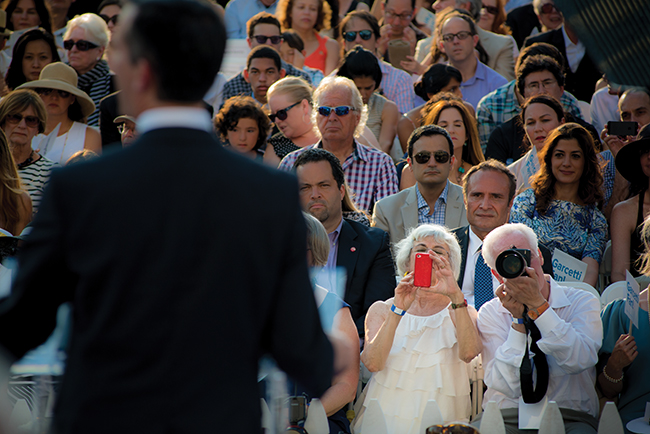
In the spotlight Above right: Eric plays Little League baseball at Balboa Park. Left: Sukey and Gil take photos of their only son while he gives a speech.
VALLEY VISION
When it comes to the Valley, the mayor says his #1 goal is to generate jobs. “I want to see jobs come to the Valley, whether it’s old industries like aviation and aerospace that have been an important part of our history and that we have to reboot, or whether it’s new industries like new digital information technologies.”
He plans to encourage job creation by eliminating the gross receipts tax, cutting red tape at City Hall and promoting workforce development programs—like he did (while City Council president) to save the aviation school at Van Nuys Airport.
Eric also aims to bring in green industries that offer green jobs, helping provide a more sustainable local environment. He says he is working on a plan to create 20,000 local clean energy, energy-efficient and clean water jobs, with a focus on building retrofit, solar installation and design, component manufacturing and maintenance jobs. The plan proposes using local government tools such as LA’s green building ordinance, solar Feed-In Tariff program and Low Impact Development ordinance to spur as much as $2 billion in private and public investment.
In addition, the mayor says he’ll fight for LA’s fair share of funding from California’s Prop 39, which provides $500 million annually statewide for clean energy. If allocated fairly, he believes LA would receive $60 million annually.
He’d like to see more promotion of the Valley—specifically getting more cultural and economic development dollars committed to it. He wants to use his office as a “bully pulpit” to make people understand that the Valley, with its countless film and TV studios, Balboa Park, nature hikes and the Sepulveda Basin, should be as much of a tourist destination as Anaheim, the beach or Downtown LA.
He’d like to see the Tourism & Convention Board get more involved with the Valley. And with so many wonderful parks, he feels the budget for the LA Department of Recreation and Parks has been too deeply cut.
“I feel too often the Valley gets shortchanged,” he points out, adding that after all, “If the Valley were a separate city, it would be the sixth largest in America.”
The elder Garcetti can’t help but note his paternal pride. But when it comes to his son following in his footsteps, he says, “Eric has gone way beyond me. His footprints are larger than mine.”
Eric, however, disagrees. “No, I always look at service not in terms of how high you go but what sort of impact you make. He improved the lives of countless people with the cases he prosecuted, providing victims of crime some sort of justice. And as for me, I’m still the same person I was before I got this office.”
He stops for a few photos outside Tommy’s. One customer stops to shake his hand. Another waves from the drive-through line. Then LA’s new mayor, still sipping his root beer, is off to his next destination.
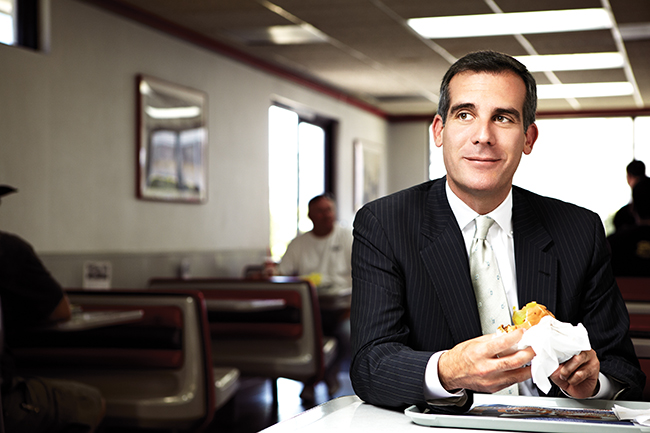
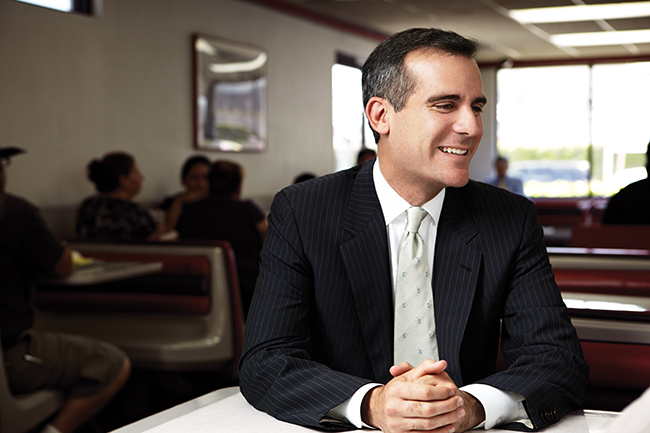
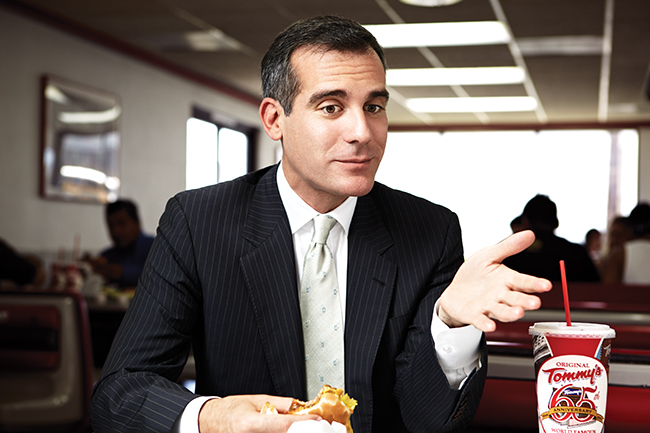
More Stories





